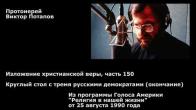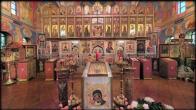ABOUT ORTHODOXY
You are here
The Parable of the Rich Man and Lazarus
The parable of the rich man and Lazarus gives us an example of an extremely foolish utilization of material goods, and it raises slightly the curtain covering certain mysteries about man's portion beyond the grave. We encounter this parable in the Gospel according to Luke:
There was a certain rich man, which was clothed in purple and fine linen, and fared sumptuously every day: and there was a certain beggar named Lazarus, which was laid at his gate, full of sores, and desiring to be fed with the crumbs which fell from the rich man's table: moreover the dogs came and licked his sores. And it came to pass, that the beggar died, and was carried by the angels into Abraham's bosom: the rich man also died, and was buried; and in hell he lifted up his eyes, being in torments, and seeth Abraham afar off, and Lazarus in his bosom. And he cried and said, Father Abraham, have mercy on me, and send Lazarus, that he may dip the tip of his finger in water, and cool my tongue; for I am tormented in this flame. But Abraham said, Son, remember that thou in thy lifetime receivedst thy good things, and likewise Lazarus evil things: but now he is comforted, and thou art tormented. And beside all this, between us and you there is a great gulf fixed: so that they which would pass from hence to you cannot; neither can they pass to us, that would come from thence. Then he said, I pray thee therefore, father, that thou wouldest send him to my father's house: for I have five brethren; that he may testify unto them, lest they also come into this place of torment. Abraham saith unto him, They have Moses and the prophets; let them hear them. And he said, Nay, father Abraham: but if one went unto them from the dead, they will repent. And he said unto him, If they hear not Moses and the prophets, neither will they be persuaded, though one rose from the dead (Luke 16:19-31).
From a first reading of this parable, it is not entirely clear why the rich man ended up hell. Because he was rich in this life? We know from the Gospel that, even though wealth is seductive and far from always being beneficial for spiritual life, still, not all the rich were condemned. Zaccheaus, the rich tax collector, in spite of his wealth, was saved, none the less, with all his family (Luke 19:1-10). We remember the wealth of Joseph of Arimathea, the disciple of Christ, in whose tomb the Saviour was buried (Matthew 27:57-60). Likewise, the Pharisee Nicodemus, one of the chiefs and leaders of the people of Israel was hardly a poor man. After all, it was he who brought a hundred liters of expensive aromatic oils to anoint the body of Jesus Christ (John 19:39). We remember that the rich young man was not condemned by Christ for his wealth, which apparently did not hinder him from remaining a faithful, pious man or from keeping all God's commandments, or, upon learning of Christ, from coming and venerating Him as a teacher. Christ did not at all condemn the rich young man's way of life, but pointed out to him a more perfect way.
Christ never said that the rich will not enter into the Kingdom of God, but that men will not enter into it who trust in wealth, who think that not God, but wealth will save them (Mark 10:24), who make an idol or fetish of wealth (Mammon).
In the Bible, we know examples of righteous men who were very rich: The righteous Joseph - the son of Israel - controlled the vast treasures of Pharaoh, was arrayed in a royal manner (Genesis 41:40-45) and was the second man in the realm. The righteous Job - blameless and God-fearing - was very rich: He had 7,000 head of livestock, 3,000 camels, 500 pair of oxen and 500 she-asses and a great many servants (Job 1:3).
In the history of the Christian Church, there were canonized many emperors and kings - those anointed to reign - who controlled all the wealth of their country as personal property, and this did not prevent some of them from becoming saints. In Russia and America the were and are millionaires who have done a great deal of good and have distributed their vast wealth on philanthropy.
But all the same, why did the rich man in the parable we are examining end up hell? It does not say in the Gospel that he was evil, cruel, depraved, godless or impious. The Evangelist Mark discloses the crux of the matter to us and says that many of the rich are condemned not because of their wealth, but because of their trust in it: how hard it is for them that trust in riches to enter into the kingdom of God! (Mark 10-24). Excessive repletion, satiety and self-satisfaction are dangerous for a man. And it is precisely this that is bad, and not any other, external thing. Money is not bad in itself, but one's attitude toward it. It is bad to be limited, self-satisfied and at ease. And, on the contrary, it is good to be always dissatisfied with oneself, always to hunger and thirst after righteousness. It is good to be always poor in spirit and to ask alms of Christ unceasingly. All satiety pampers a man, puts him at ease and makes him undisturbed. Such a man may reach such a state, that he may decide that he needs no one - neither man, nor God. It is precisely such a self-satisfied, untroubled and sated state that is dangerous for a man, for his conversion to Christ - be he rich or poor. We must never be at ease, but must always seek and ask, always thirst and be in need, always be conscious of ourselves as destitute, not self-sufficient, but dependent on God.
The rich man's fault was that he lived only for the flesh; he enjoyed earthly goods without measure and completely stifled within himself every manifestation of spiritual life. By this, precisely, he also prepared for himself a bitter fate. The Apostle Paul says: Be not deceived; God is not mocked: for whatsoever a man soweth, that shall he also reap. For he that soweth to his flesh shall of the flesh reap corruption; but he that soweth to the Spirit shall of the Spirit reap life everlasting (Galatians 6:7-8). Each man himself prepares for himself his portion beyond the grave. If he abides in God's will, that is, does His commandments, which command love toward God and neighbor; if he repents when he transgresses these commandments in any way; if he nourishes his soul with the Church's mysteries; if he abides in prayerful communion with the Lord; then about such a man one may say that he soweth to the Spirit. Such a man already in this life begins communion with the spiritual world; he becomes, as it were, its citizen. After death, such a man enters into a better world and enjoys its good things, because during his temporal life he managed to acquire in himself the ability to enjoy them.
Genuine faith begins with repentance - only with repentance, that is, with the consciousness of one's insufficiency, of one spiritual poverty and sinfulness. Repent ye: for the kingdom of heaven is at hand - say both the Forerunner and Christ (Matthew 3:2, 4:17). The Kingdom of God not only begins, but also continues and is maintained only by repentance, by the consciousness of one's limitedness, sinfulness and spiritual destitution. The constant prayer of the Christian consists of the brief words: "Lord Jesus Christ, Son of God, have mercy on me, a sinner!". Without this prayer a Christian cannot live, and he spiritually dies. Consciousness of one's sinfulness, poverty and helplessness makes a Christian a worthy disciple of the Saviour, a worthy member of Christ's Church, in spite of the sinful nature in which he was born.
The destitute Lazarus received a heavenly reward, of course, not because of his material destitution, but because of his consciousness of his spiritual destitution, because in this sense he apparently listened to Moses and the Prophets (Luke 16:29). And the rich man of the parable was punished because he did not have this spiritual destitution, because he was not only physically sated, but also spiritually, and he trusted in his wealth, as in an idol. He did not feel a need for God's help.
If a man will only pass from one amusement to another, from one carnal pleasure to another, as did the rich man who fared sumptuously, then he will make his soul incapable of any spiritual sensation. And this will be so even in the event he does not commit great sins. This is evident from the example of the rich man. He became hardened in soul to such an extent that he did not show any compassion for Lazarus, who lay at his gate and whom he constantly saw. The soul of the rich man became incapable of love for his neighbor.
What can such a man expect in the world beyond the grave? He is incapable of communion with God. God is love, and it is only possible to commune with Him by means of love. The rich man does not have this love. He is also incapable of communing with the spirits of the righteous, since He did not acquire a likeness to them; he has nothing in common with them. We read in the parable that between him and the righteous there is a great gulf fixed. Since his soul is incapable of spiritual feelings, the rich man cannot enjoy the good things of the Kingdom of Heaven. Against his will, such a one will remain separate from God and from the world of the righteous; he will remain in outer darkness. The passions, which the rich man managed to amass during his life, will burn him with everlasting fire. His conscience, whose injunctions he constantly transgressed, will become an unsleeping worm for him, which will gnaw at him. He himself is to blame for this. God constantly warned him. But he did not heed this warning. He cast himself into the abyss of hell.
From the parable of the rich man and Lazarus, the conclusion is usually drawn that the torment of sinners will be endless. The torment itself is depicted in the form of fire that burns but does not consume. But the fire, smoke and all the other horrors are a distorted representation of the torments of hell. In actual fact, according to the teaching of the Holy Fathers of the Church, the essence of the torments of hell does not lie in physical sufferings, but in remoteness from God and in the absence of spiritual compunction. Compunction is possible only under the conditions of full and sincere repentance. Therefore, torment would be endless if repentance would be impossible. Metropolitan Antony (Khrapovitsky), the preeminent theologian of this century, points out that, although in the Gospels everlasting punishment is spoken of time and again, this expression is not synonymous with endlessness. According to Metropolitan Antony's thought, this expression can also be understood as a characteristic of the unassuagableness of the torment in a general sense; but in the Word of God there are no definite indications of the endlessness of the sufferings of all sinners and that their fate cannot change. Abraham's words about the gulf between the righteous and sinners in the other world, which it is impossible to cross over, do not speak of the unalterability of the state of sinners. Yes, it is impossible to cross over this gulf without changing; but this does not yet speak of the impossibility of changing.
I shall bring forth a few more of Metropolitan Antony's thoughts on man's fate beyond the grave, that flow from today's parable:
"The parable of the rich man and Lazarus gives us, as it were, two rays of hope for a more consoling prospect. First of all, we see that Abraham in paradise did hear the rich man, and, consequently, there is between them some kind of communication, if only in the form of conversation. This, their conversation, indicates that sinners have the thought and hope for something better. This alone already eases their condition, because the most fearful thing is not the suffering itself, but the hopeless consciousness of the endlessness of the sufferings. The rich man does not have this hopeless consciousness; but, on the contrary, he has an aspiration and hope for something better.
"Secondly, the rich man begins to feel sorry for his brethren. This shows that good feelings had awakened in him, that he had begun to repent and hopes for their repentance. This means that in the life beyond the grave a certain change in a man's state is possible, because repentance that has begun can already turn into full repentance and then into compunction.
"The rich man does not yet know full repentance For the present, he only understands the causal tie between his condition before, on earth, and now, in hell; but he does not understand the justness of his condition. But all the same, he has begun to feel sorry for his brethren, which is very important for the further development of his soul.
"If in that life there is a possibility of changing one's state in the sense of manifesting good feelings and repentance, then one must allow the possibility of full repentance and then compunction; then one must allow the possibility of hope that the doors of paradise are not closed once and forever. One must likewise allow the hope that, in passing through some kind of suffering, the soul of the sinner, if it has not become completely hardened, can become capable of repentance, at first partially, as with the rich man, and later fully; and then the soul can revive for spiritual compunction and salvation".
Let us ask the Lord to imbue in us the need, the hunger and the thirst to feed on the divine sap that issues forth from the Vine - Christ - which is given unto us at the Lord's Table, at the Holy Eucharist.
Let us pray that in our consciousness we would grow completely poor and become poor in spirit, as Lazarus, and that we, like the beggars who stand in the porches of churches, would constantly stretch out our hand and beg alms of Christ, Who Himself also, according to the word of the Apostle Paul, though he was rich, yet for your sakes he became poor, that ye through his poverty might be rich (II Corinthians 8:9).
©V. Potapov
PARISH LIFE
RECENT VIDEOS
Address of our Cathedral
Subscribe to our mailing list
While all the materials on this site are copyrighted, you may use them freely as long as you treat them
with respect and provide attribution on the Russian Orthodox Cathedral of St.John the Baptist of Washington DC.









